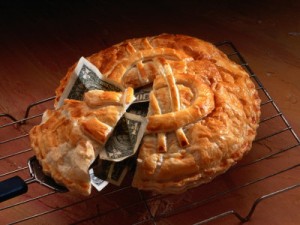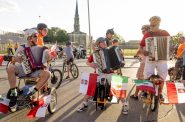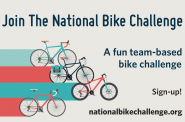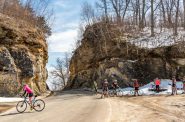Bigger State Pie, But Smaller Slice for Bikes
Gov. Walker grabs $38 million in federal money meant for bikes to hike his highways budget even higher.

A smaller slice of the pie.
The 2013-2015 budget (AB40) Gov. Scott Walker submitted to the State Assembly yesterday proposes to increase the biennial transportation budget from $5.7 billion to $6.4 billion. Hold on though, even though the pie just got a lot bigger, the slice for people who ride bikes is significantly smaller. I have consolidated the many line items that make up each program into the simple table below. I also added the total amount of money the federal transportation budget makes available to Wisconsin for projects related to bike-transit, compared to what the state proposes to actually use for that purpose.

Available funds for bicycle projects.
You can see the federal transportation budget has made $44.6 million available to Wisconsin in 2014 in categories that can be used to pay for bicycle facilities, but the state is allocating just $25.5 million in 2013-’14 for those categories. For 2014, the feds have again provided $44.6 million in bike transit-related funding but the state plans to spend just $25.6 million in those categories. Of about $89 million provided by the feds over this two year period, the governor’s budget only proposes to spend about $51 million (compared to nearly $70 million in the last biennial budget). So where is the remaining $38 million going? The federal transportation budget allows states to shift 50% of the Transportation Alternatives funds to highway projects, and that’s likely where the money went. I’m sure we are not giving that money back to the feds.
But the bottom line to bike folks is that even though there is a lot more money in the proposed two-year state transportation budget, this budget not only shorts us the money the feds are offering, it allocate even less money than was in the last state budget. That is quite a double whammy.
If you care about this, it is extremely important to remember that the state legislature still has until some time around July to modify and approve the budget. That gives advocates, business leaders and civic leader who care about our treasured bicycle assets time to talk to their elected representatives in the Senate and Assembly to convince them to restore the full funding for programs that fund bicycle projects.
The easiest way to effect change is to call, email or meet with the people who represent you in the State Capitol and tell them that you would like them to spend every one of the comparatively few dollars the feds give Wisconsin for bike projects on bike projects. It is also critically important that people who care about funding for bicycle projects come to the Bike Fed’s Lobby Day, April 9th. We do a lot of the work for you by setting up meetings for constituents in each district. We also give you clear, detailed information so you can make an intelligent ask.
In the mean time, we are working to set up a meeting with the Governor and key legislative leaders to explain all the good that bicycling does for Wisconsin. From the nearly $2 billion economic impact to the quality of life benefits that make our state a great place to live and an attractive place to do business, few things have as high a return on investment as bicycling.
So please, contact your elected state officials and tell them you bike and you vote, and stay tuned here for updates.
This story was originally published by the Bicycle Federation of Wisconsin.
Bike Czar
-
Join a Bike Ride Under the Polish Moon
 Jun 1st, 2018 by Dave Schlabowske
Jun 1st, 2018 by Dave Schlabowske
-
9 Reasons to Join National Bike Challenge
 May 4th, 2018 by Dave Schlabowske
May 4th, 2018 by Dave Schlabowske
-
Biking Through the Mindoro Cut
 Apr 27th, 2018 by Dave Schlabowske
Apr 27th, 2018 by Dave Schlabowske






















What you fail to mention is that through Trans 75, virtually all street and highway projects built with any federal money must contain bicycle and pedestrian accommodations. So, not only do you have the money allocated strictly for alternate transportation, but you also have many trails, paths, sidewalks, etc being built in conjunction with street improvements, that will not draw on money put aside for bicyclists. So, your article does not tell the entire story.
Corey,
You are correct that to some extent, the Trans 75, or Complete Streets Law, that the Bike Fed got passed a few years ago has definitely helped get bicycle “accommodations” included on more resurfacing and reconstruction projects and will continue to do so as long as it remains on the books. In effect, Trans 75 does then bring additional funds to the table for bicycle and pedestrian facilities on projects that use federal funds, but that is not enough to make up for the loss of federal funds. The projects completed under the 3 R program do not allow for the construction of any new bicycle or pedestrian facilities not associated with a road project. Many of the most important missing links are new trails that fill gaps between existing trails. The definition of a bicycle accommodation is not necessarily a bike lane or even a paved shoulder with a stripe. It might just be a wide curb lane. So while Trans 75 is a bonus, it often results in facilities that provide a much lower level of service for non-motorized road users than a stand-alone project that comes with it’s own funding source.
You are correct though that Trans 75 is very important. It has proven to make a difference already, but communities still need Capital Programs for stand-alone projects not associated with a resurfacing or reconstruction project that uses state or federal funds. Only Madison has a Capital Program for bike and ped projects, so diverting federal dollars from bike programs to highways will have a big impact at the local level. I think it is wrong that most communities don’t set aside local funds for anything but the local share of federal grants (typically 20% match required), but that doesn’t mean non-motorized travel is any less important a line item to fund at the state level.
Allocating more and more money for mega projects and cutting funds for non-motorized projects is kind of like skipping the whole wheat bread and vegetables so you can afford to buy extra soda and chips.
Thanks for reading, writing and riding.